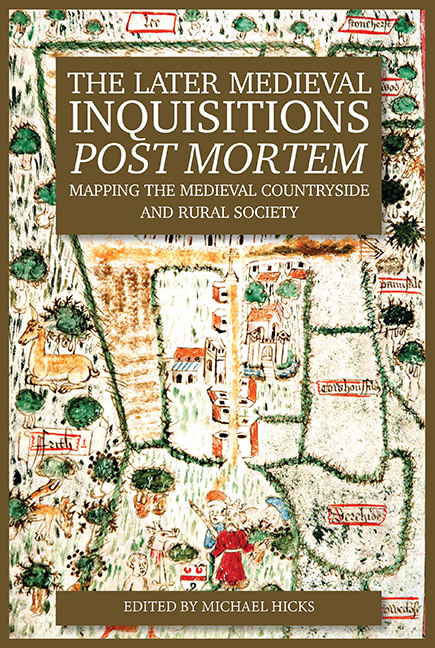Book contents
- Frontmatter
- Contents
- List of Illustrations
- List of Contributors
- Glossary
- List of Abbreviations
- 1 Introduction
- 2 Records of an Imperial Administration? Inquisitions Post Mortem in Scotland and Calais
- 3 Inquisitions Post Mortem in Medieval Ireland
- 4 The Court of the Honour of Clare, 1308–60: Feudal Incidents and Inquisitions
- 5 Landscape, Farming and Society in an English Region: The Inquisitions Post Mortem for the West Midlands, 1250–1509
- 6 Beyond the Dots: Mapping Meaning in the Later Medieval Landscape
- 7 Fairs and Markets in the Inquisitions Post Mortem
- 8 The Structure of the Milling Industry 1427–37
- 9 Proofs of Age 1246 to 1430: Their Nature, Veracity and Use as Sources
- 10 What Went On in the Medieval Parish Church, 1377–1447, with Particular Reference to Churching
- 11 Retainers, Monks and Wine: Three Insights into Everyday Life
- 12 The Administration and Efficiency of the Inquisitions Post Mortem Process: A Case Study of Northumberland
- 13 Late Medieval Land Disputes and the Manipulation of the Inquisitions Post Mortem
- Index
13 - Late Medieval Land Disputes and the Manipulation of the Inquisitions Post Mortem
Published online by Cambridge University Press: 26 May 2021
- Frontmatter
- Contents
- List of Illustrations
- List of Contributors
- Glossary
- List of Abbreviations
- 1 Introduction
- 2 Records of an Imperial Administration? Inquisitions Post Mortem in Scotland and Calais
- 3 Inquisitions Post Mortem in Medieval Ireland
- 4 The Court of the Honour of Clare, 1308–60: Feudal Incidents and Inquisitions
- 5 Landscape, Farming and Society in an English Region: The Inquisitions Post Mortem for the West Midlands, 1250–1509
- 6 Beyond the Dots: Mapping Meaning in the Later Medieval Landscape
- 7 Fairs and Markets in the Inquisitions Post Mortem
- 8 The Structure of the Milling Industry 1427–37
- 9 Proofs of Age 1246 to 1430: Their Nature, Veracity and Use as Sources
- 10 What Went On in the Medieval Parish Church, 1377–1447, with Particular Reference to Churching
- 11 Retainers, Monks and Wine: Three Insights into Everyday Life
- 12 The Administration and Efficiency of the Inquisitions Post Mortem Process: A Case Study of Northumberland
- 13 Late Medieval Land Disputes and the Manipulation of the Inquisitions Post Mortem
- Index
Summary
This is very much a preliminary study of a complex subject, and it is largely based on a series of case studies that may or may not be meaningfully representative. Its argument may thus fall into the modern confusion of thought that indicts an entire system for what may be only its occasional failings. Nonetheless, in the case of the inquisitions post mortem these failures were important, at least when conceived in terms of individual cases.
Taken on the deaths of tenants-in-chief or of tenants of mesne lords in royal wardship, inquisitions had two main purposes, namely to discover royal rights, which had a particular value when the heir was a minor, and to identify the heir or heirs and so secure the formal transmission of the lands held in chief into the next generation. There are thus two distinct themes in discussing the manipulation of inquisitions. The first, partially discussed by Bean in his Decline of English Feudalism of 1968, relates to those inquisitions that were designed either to inflate or, more commonly, to diminish the feudal rights of lords, principally, of course, those of the greatest lord, the crown. The second theme, the subject of this paper, concerns those that were intended illegitimately to promote the claim of one individual to land over that of another.
Such manipulation played an important part in many land disputes, for inquisitions had a crucial role in the transmission of property both within and between families. They determined the title to land which, in the first instance at least, was acknowledged by chancery and upon which livery of seisin was awarded. It is the contention of this paper that they were ill-adapted to discharge so important a role. Such a contention would not have surprised contemporaries. A statute of the reforming Parliament of 1429–30 (8 Hen. VI, ch. 16) spoke of the daily disinheritances which occurred through the dishonesty of escheators who for ‘lour propre gayne’ took inquisitions, ‘favourablement et noun duement’ by juries not empanelled, as law demanded, by the county sheriffs.
Even, however, leaving aside these problems of the integrity of escheators and improperly empanelled juries, there were two general problems with the inquisition system. First was its reliance on jurors, who, even when properly empanelled, were generally drawn from, at best, the margins of gentry society.
- Type
- Chapter
- Information
- The Later Medieval Inquisitions Post MortemMapping the Medieval Countryside and Rural Society, pp. 203 - 214Publisher: Boydell & BrewerPrint publication year: 2016



